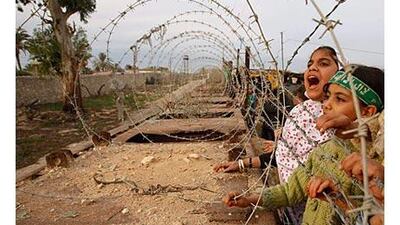CAIRO // One year after Israel's offensive in Gaza, the Egyptian government is still defending its policies surrounding the devastating three-week campaign as it pushes ahead with the construction of a steel wall between itself and its impoverished neighbour. The anniversary led to a deluge of attacks from opponents and activists against Egypt's approach to the Palestinian people, the stalled peace process and in particular the Gaza Strip, with which it shares a border.
Cairo has failed to broker a permanent ceasefire between Israel and Hamas, which it had promised just after the war, and has been unable to secure the release of the Israeli soldier Gilad Shalit in exchange for Palestinian prisoners. Crucially, Egypt has failed to use its influence to bring about a reconciliation between Fatah, which heads the Palestinian Authority, and Hamas. Mufid Shehab, the minister of state for legal and parliamentary affairs, said on Sunday at a meeting of the Shura council, parliament's upper house, that the "Egyptian government will provide all facts to stop the flood of accusations against Egypt that is trying to take away from Egypt limitless support of the Palestinian people".
His comments came as activists prepared to commemorate the first anniversary of the attack on Gaza by holding protests and attempting to break the siege by crossing the border with Egypt with a convoy of aid. Ahmed Aboul Gheit, the foreign minister, said Egypt has told the Viva Palestina Aid Convoy, which took off from England, that Egypt wants it to enter from el-Arish not Sinai adding that anyone who "wants to come to Egypt has to enter from the gate that Egypt decides", he said in comments carried by Egypt's official news agency Mena on Saturday.
He added that the Rafah border crossing will be open only between January 3 and 6. "The Egyptian state and people paid a very high price and paid with their blood for more than 50 years in support of the Palestinians. No one should compare himself with what Egypt did and is still doing for the Palestinians." The hardline approach to the convoy comes amid increasing domestic condemnation of Egypt's approach to the Palestinians.
"The Egyptian government started the year with a siege of the Gaza Strip, starving its inhabitants and is ending it with building a sham steel wall to reinforce the siege even more," said Fahmy Howeidi, a prominent Islamic intellectual and columnist. He was talking at a conference last week to honour Gamal abdel Salam and Abdel Moneim Aboul Fotouh, from the Arab Doctors Union, who were released last month after spending months in prison for their aid activities in Gaza.
Dr Abdel Salam, 52, the head of the Egyptian Doctors' Syndicate Relief Committee, which organised a number of convoys to the Gaza strip, spent most of this year in prison before his release on November 13. Salama Ahmed Salama, the editor of the independent Egyptian daily newspaper Al Shorouk, added to the criticism. "There is a defect in the Egyptian policy which lead to the brothers becoming the enemy and treating our enemy as brothers should be treated," he wrote.
"This sudden coup [shift] in the [Egyptian] goals and policies and in enmities and alliances are surprising and incomprehensible." Egypt's decision to build a steel wall along its border with the Hamas-run Gaza Strip has become a focus for opponents of the regime and its approach to Gaza. "The Egyptian people reject this wall, and the government attempts to ban Gaza Freedom March, and oppose the regime's policies because they are in the interest of the Zionists, our real enemies, and increasing the suffering of our Palestinian brothers," said Mohammed Morsi, a leader with the Muslim Brotherhood, Egypt's oldest and strongest opposition group.
But in an interview on Saturday, with Egyptian state TV, Mr Aboul Gheit said: "Egypt is not going to halt building the wall with Gaza because Egypt is not ready to cease protecting its people." nmagd@thenational.ae

